
The newsletter of UCL Library Services - Issue 25: Summer vacation, 2010
Inside this issue
|
|
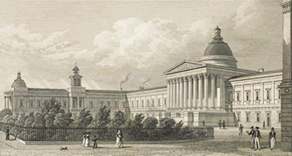
An early view of the main UCL building, 1828
|
|
Editorial board members:
Janet Cropper, Chris Carrington, Anne Chesher, Deborah Furness, Jason Hobart, Nova Larch, Grazia Manzotti, Martine Painter, Ruth Russell & Margaret Stone.
:: Contact the editorial board
|
Research Survey
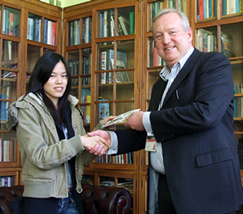 Late in December 2009, we ran an online survey of UCL researchers to find out what they like and don’t like as the Library plans for 2010 onwards. We wanted views on current services and resources and on priorities for the future. There were exactly 1500 responses in total, with 60% of responses being from the core research community of UCL staff and research students.
Late in December 2009, we ran an online survey of UCL researchers to find out what they like and don’t like as the Library plans for 2010 onwards. We wanted views on current services and resources and on priorities for the future. There were exactly 1500 responses in total, with 60% of responses being from the core research community of UCL staff and research students.
Print and electronic collections
Unsurprisingly, UCL Libraries' collections of traditional print research books and journal back runs were highly rated. The most highly-rated electronic resources included the Library's web-based Catalogue and our web list of electronic journals, including links to current and back issues (pre-1997).
In terms of satisfaction with the range and depth of research collections, e-journals, printed books and bibliographic databases were all top scorers. Satisfaction with ease of access to e-resources was generally high, but the results usefully identify areas where we can aim to improve and we note an ongoing and enormous appetite for remotely accessible e-resources.
Services
There was a real vote of confidence in the staff-based support services we offer, including specialist staff and our Subject and Site Librarians. Among the most valued of research services were our Enquiry Services offered by email and in person, and the Inter-library Loans Service. There is clearly more we can do in terms of focused training for research support.
Libraries as spaces
Satisfaction with the physical environment in UCL's libraries was markedly and worryingly lower than for other services and resources. The availability of study spaces and of computer resources (both for ISD clusters and for facilities for laptop usage) are clearly areas where researchers feel we should be doing better.
Priorities for now and into the future
There were three major priorities overall:-
- Electronic access to journals away from the Library
- Electronic access to books away from the Library
- Electronic access to journal volumes before 1997
Our summary report details findings where there is significant variation between respondents from different faculties. It also outlines our preliminary conclusions and how we propose using our findings for planning and development. A big thank you to everybody who took part. The winner of the prize draw was Chia-Yu Kou, a research student in Management Research & Innovation and she was presented with her prize on Friday 5th March by Dr Paul Ayris, Director of UCL Library Services (pictured above).
by Vincent Matthews
350th Anniversary of The Royal Society
The Royal Society officially dates its foundation to November 1660 when a group of learned men including Christopher Wren and Robert Boyle created "a Colledge for the Promoting of Physico-Mathematicall Experimentall Learning". They met weekly to discuss scientific matters and conduct experiments and then in 1665 they produced one of the world’s first scholarly journals, Philosophical Transactions, which has been published regularly ever since.
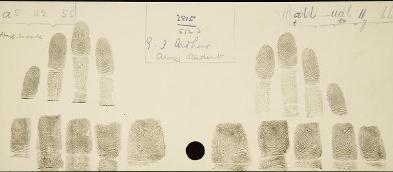
 2010 marks 350 years of the Society and to celebrate the occasion they have made 60 significant papers from their journal available to the public. This amazing site has a timeline which lists key historic events alongside the selected papers and makes fascinating reading, but UCL staff and students have access to far more than can be found here as UCL Library Services has provided access to all the Transactions papers from 1665 onwards for some years by subscribing to the JSTOR database. So, log in to JSTOR via our databases A-Z, and browse by title to Philosophical Transactions. Continue browsing from the very first issue onwards or search for something that interests you by entering it into the box on the right-hand side, and be prepared to spend some time in the past.
2010 marks 350 years of the Society and to celebrate the occasion they have made 60 significant papers from their journal available to the public. This amazing site has a timeline which lists key historic events alongside the selected papers and makes fascinating reading, but UCL staff and students have access to far more than can be found here as UCL Library Services has provided access to all the Transactions papers from 1665 onwards for some years by subscribing to the JSTOR database. So, log in to JSTOR via our databases A-Z, and browse by title to Philosophical Transactions. Continue browsing from the very first issue onwards or search for something that interests you by entering it into the box on the right-hand side, and be prepared to spend some time in the past.
Look out for a new exhibition on the Main Library staircase this Summer which will celebrate UCL’s connections with the Royal Society.
by Debs Furness
The Birds and the Bees!
Last year Special Collections were very happy to show off some of the Library’s treasures at three events organised by the English Alumni Department. The first session was on Milton, the second on Shakespeare and the third on Literature and Song. There were lectures, debates, music, receptions and, during the tea breaks, a chance to examine some items from the Library’s Special Collections.
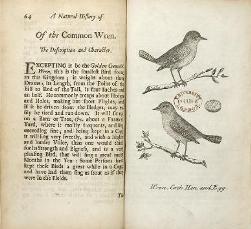 For the theme of Literature and Song we managed to find some very interesting and diverse items, including fragments of Medieval manuscripts, song sheets from the Gaelic Society Collection, an edition of Purcell’s Orpheus Britannicus1, the libretto of a Handel opera, Lotario2, and books on birds and bees.
For the theme of Literature and Song we managed to find some very interesting and diverse items, including fragments of Medieval manuscripts, song sheets from the Gaelic Society Collection, an edition of Purcell’s Orpheus Britannicus1, the libretto of a Handel opera, Lotario2, and books on birds and bees.
Thomas Salmon (c.1647-1706) was a clergyman who caused one of the greatest controversies of his day when he published his Essay to the advancement of musick3 in 1672, in which he advocated several innovations concerning musical notation. He wanted to demystify music and its “dark and tedious principles” and to make it quicker and easier to learn. He suggested a new clef system to achieve this. His work provoked an enormous, passionate, and occasionally vicious response.
Joseph Ritson (1752-1803) was an antiquary who collected popular poems and songs. He was an argumentative person and became embroiled in many literary controversies. He was also involved in radical politics being a passionate supporter of the Jacobins in France. He published several anthologies of ballads, songs, poems and nursery rhymes. His Select collection of English songswith their original airs: and a historical essay on the origin and progress of national song was first published in 1783.4
Singing birds have been highly esteemed and kept as pets for centuries. In the Ogden collection there are two works originally written in French by Hervieux de Chanteloup5. The first deals with canaries and nightingales and the second solely with canaries. They were the first full-length books written on canary birds, which have been kept in captivity since the early 1600s. Canaries were much valued for their fine songs and were very expensive. The books have several fine plates.
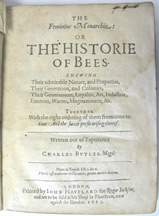 A natural history of English songbirds6, by Eleazar Albin, was printed in London in 1737, with engravings by the author. It is a charming little book, giving details of the birds’ appearance and habits, instructions on how they can be caught, kept and bred in captivity, and describes their songs. Albin produced several other books on natural history, including A natural history of birds: illustrated with two hundred and five copper plates, curiously engraven from the life. And exactly colour’d by the Author ( London, 1738)7. This was the first English book on birds with colour illustrations. The plates are all hand coloured, by Albin and his daughter.
A natural history of English songbirds6, by Eleazar Albin, was printed in London in 1737, with engravings by the author. It is a charming little book, giving details of the birds’ appearance and habits, instructions on how they can be caught, kept and bred in captivity, and describes their songs. Albin produced several other books on natural history, including A natural history of birds: illustrated with two hundred and five copper plates, curiously engraven from the life. And exactly colour’d by the Author ( London, 1738)7. This was the first English book on birds with colour illustrations. The plates are all hand coloured, by Albin and his daughter.
Probably the most curious item, and the most popular on the night, is a book called The feminine monarchie: or, the historie of bees8, printed in 1609. The author is Charles Butler, a logician, grammarist, and bee-keeper. It is the first full-length English language work on bee-keeping and was a valued and practical guide for nearly 300 years.
Bees figure in much mythology and have been used by political theorists as a model for human society since ancient times. The image of a community of bees working in harmony together for the good of the whole has appeared in the works of Aristotle, Plato, Virgil, Seneca, Erasmus, Shakespeare and Karl Marx.
Butler was among the first bee-keepers to understand that the largest bee was female and that the drones are male. Amongst the practical information is a curious section in which Butler has transliterated the tones of the bees’ buzzing and arranged it as a musical score. It is set as a madrigal for four singers, with parts printed upside down and sideways. Butler revised the book in 1623 and 1624. He also wrote a book on music theory in 1636. He spent most of his life as Rector of Wooton St. Lawrence, in Hampshire.
Citations/References
- Purcell, Henry. Orpheus Britannicus. A collection of all the choicest songs for one, two, and three voices… The second edition with large additions. London: Printed by William Pearson, 1706. Strong Room E Quarto 340 P8
- Salvi, Antonio. Lotario, : drama. Da rappresentarsi nel regio teatro d’Hay-market. [Music by G.F. Handel]. London: Thomas Wood, 1729. Strong Room E 221 S15
- Strong Room Ogden A 696
- 3 vol. 2 nd edition of 1813. Strong Room E 221 R4
- Hervieux de Chanteloup, J.-C. Unterricht von den verschiedenen Arten der Canarienvögel und der Nachtigallen, : wie diese beyderley Vögel aufzuziehen, und mit Nussen so zu paaren senn, dass man schöne Junge von ihnen haben Kann nebst verschiedenen Anmerkungen von den Ursachen ihrer krankheiten und wie man selbige curiren solle. Mit Kupfern. Frankfurt und Leipzig: [s.n.], 1772. Bound with: Des Herrn Hervieux besondere Nachricht von denen Canarien-Vögeln. Frankfurt und Leipzig: Johann August Raspe, 1758. Strong Room Ogden A 605/1-2
- Strong Room E 920 A5
- Strong Room E Quarto 920 A5 (1)/1-2
- Strong Room Ogden A 522
by Susan Stead
Profile - Lynne Meehan, Subject Librarian, Science Team
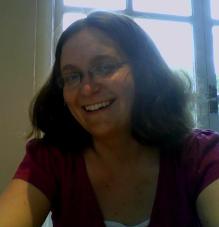 I joined UCL Library in 1997 as a graduate trainee after finishing my Physiology BSc at the University of Manchester. The idea behind this was to give me experience of working in libraries for a year and then move on to study for a Masters in Library and Information Science. My plans changed during that year and I stayed on at UCL and studied for the MA part time. During my time here I have worked at various sites and sections in Library Services, but I always seem to return to the Science Library.
I joined UCL Library in 1997 as a graduate trainee after finishing my Physiology BSc at the University of Manchester. The idea behind this was to give me experience of working in libraries for a year and then move on to study for a Masters in Library and Information Science. My plans changed during that year and I stayed on at UCL and studied for the MA part time. During my time here I have worked at various sites and sections in Library Services, but I always seem to return to the Science Library.
My current role as Subject Librarian in the Science Team started in January 2008. Together with the other Subject Librarians in the Science Subject Team, I am here to help with the information needs of the Faculty of Mathematical and Physical Sciences and the Faculties of Engineering Sciences and Built Environment. My day can involve finding textbooks for students, welcoming new members of staff to the Library, providing database training to staff and students and buying new books and resources for the relevant subjects. There are Subject Librarians for every department at UCL.
Part of my role is making sure we have the right books and journals to meet the needs of UCL’s teaching and research. I enjoy this as not only is it about buying textbooks for courses but also keeping up to date with my departments’ research interests. Subject Librarians always welcome book suggestions so please email us with any that you have.
Subject Librarians are also responsible for delivering information skills training to the staff and students in our department. We meet many students in the first few weeks of the year, but we provide training throughout the year, from group training to 1:1 consultations. Recently, in conjunction with the Graduate School, the Science Subject Team introduced a programme of information skills trainining for postgraduates in our faculties. These have been well received and we are looking forward to continuing and expanding on the programme in the new academic year.
Another part of my job is to maintain good communication with my departments and I hold regular meetings with their Library Representatives. The Science Team also blogs to update staff and students in our faculties.
We also went out and about during the first term this session and we could be found in the Engineering Café with a laptop, there to answer any questions from staff and students who hadn’t quite made it to the Library yet. We are always happy to receive feedback and comments from staff and students in our Faculties. You can send us feedback either on the blog, via the Twitter feed or email us at lib-sciteam@ucl.ac.uk.
The Science Subject Team can be found in Room 314 on the 3rd floor of the Science Library. Please feel free to come and see us with any queries on library resources you may have or you can email lib-sciteam@ucl.ac.uk.
On behalf of the Science Subject Team, we hope you all enjoy your Summer.
by Lynne Meehan
The Learning Laboratory - a successful experiment
Since September 2009, the ground floor of the UCL Science Library has been buzzing with students experiencing the new services which were installed during Summer 2009.
The Learning Laboratory was developed to encourage co-operative working. It is a space where students can share information, with the Library Enquiry Desk and ISD Services Desk at hand to provide information skills or IT support as required.
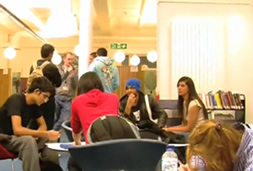 Students working in the Learning Laboratory
Students working in the Learning Laboratory
Perhaps the biggest successes of this phase of works have been the four Group Study rooms, or “pods”.
Students can choose to bring in their own laptop, with power sockets in each room or use the resident Myriad PCs to connect to the UCL network. A large LCD screen allows students to display information and work as a group. Whiteboards in each room are well-used, with formulae of all sorts scribbled on them, testament to the fact that academic work has been going on all day.
The four pods, Galton, Fleming, Carswell and Ramsay, are named after past professors of UCL and are identified by related pictures from our Special Collections which have been etched onto the glass.
The pods can be booked from the Library website. Usually, rooms are fully booked 24 hours in advance, which we take as an indication of their popularity. With the curriculum in many academic departments increasingly expecting students to work on projects and group assignments, the Learning Laboratory is here to stay.
UCL Library Services is committed to improving reader space and work is progressing for the refurbishment of the English and German reading room in the Main Library during Summer 2010.
by Benjamin Meunier
Spotlight on... UCL Eastman Dental Institute Library
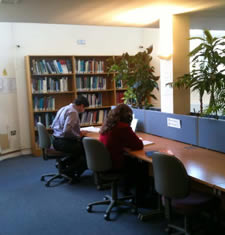 The UCL Eastman Dental Institute Library primarily provides library and information services for staff and students of the Eastman Dental Institute and the Eastman Dental Hospital. It contains one of the most specialised collections of material on dentistry and related topics in the country. Our books cover the major areas of dental practice taught by the Institute, as well as its research specialties of dental biomaterials and microbiology. Our print journal collection includes the most prominent dental journals, with some titles dating back almost a century. We also have a historical book collection and a CD/DVD collection.
The UCL Eastman Dental Institute Library primarily provides library and information services for staff and students of the Eastman Dental Institute and the Eastman Dental Hospital. It contains one of the most specialised collections of material on dentistry and related topics in the country. Our books cover the major areas of dental practice taught by the Institute, as well as its research specialties of dental biomaterials and microbiology. Our print journal collection includes the most prominent dental journals, with some titles dating back almost a century. We also have a historical book collection and a CD/DVD collection.
The Library has full computing facilites for UCL and NHS users, and walk-in access for visitors to the UCL Library Catalogue, various databases and electronic journals. Members can borrow, renew and return books via a self-service machine. There are printing, photocopying and scanning facilities and a computer cluster room with interactive whiteboard. Separated from the main area is a very pleasant quiet reading area with study desks and a row of indoor plants. Library staff are always available to answer enquiries, and one-to-one information skills training with the Librarian is available on request.
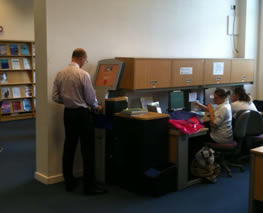 The UCL Eastman Dental Institute is the largest postgraduate dental academic centre in Europe. It offers a range of postgraduate programmes and specialist training, from short one-day courses to research degrees. Formerly known as the Eastman Dental Clinic, it was built adjacent to the Royal Free Hospital (then situated on Gray’s Inn Rd) in 1929. It was funded by the philanthropist George Eastman of the Kodak Company in New York, as thanks, it is said, to his dentist, Dr Harvey Burkhart, for making him a comfortable set of dentures and to support his personal friend, Lord Riddell, President of the RFH. The new clinic opened in November 1931, dedicated to the dental care of the poor children of London. In 1948 it was established as the dental institute of the Postgraduate Medical Federation. In 1996 the Eastman Dental Hospital became part of University College London Hospitals Trust, and in 1999 The Eastman Dental Institute became part of UCL. The Library was under Institute management until 2007, when it became part of UCL Library Services. Its book collection is now searchable on, UCL’s Library Catalogue.
The UCL Eastman Dental Institute is the largest postgraduate dental academic centre in Europe. It offers a range of postgraduate programmes and specialist training, from short one-day courses to research degrees. Formerly known as the Eastman Dental Clinic, it was built adjacent to the Royal Free Hospital (then situated on Gray’s Inn Rd) in 1929. It was funded by the philanthropist George Eastman of the Kodak Company in New York, as thanks, it is said, to his dentist, Dr Harvey Burkhart, for making him a comfortable set of dentures and to support his personal friend, Lord Riddell, President of the RFH. The new clinic opened in November 1931, dedicated to the dental care of the poor children of London. In 1948 it was established as the dental institute of the Postgraduate Medical Federation. In 1996 the Eastman Dental Hospital became part of University College London Hospitals Trust, and in 1999 The Eastman Dental Institute became part of UCL. The Library was under Institute management until 2007, when it became part of UCL Library Services. Its book collection is now searchable on, UCL’s Library Catalogue.
The Library was called an ‘Information Centre’ for a few years, but last year it was officially renamed as a ‘Library’ because although it has excellent computing facilities, and many of the resources used are to be found online, the provision of books and more traditional library functions are still a major element of its service, so this was thought to provide a clearer indication of its purpose.
Please note that during the summer we revert to our vacation hours of 9am to 6pm (Mon-Fri).
by Medwenna Buckland
 Top of page Top of page
Issue 25 - Summer vacation, 2010
|

